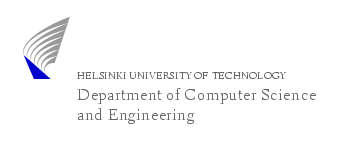
| ||||
| ||||
| Master's thesis submitted in partial fulfillment of the requirements for the | ||||
| degree of Master of Science in Technology | ||||
| Espoo, March 3, 2005 | ||||
| Supervisor: | Academy Professor Erkki Oja | |||
| Instructor: | Docent Ricardo Vigário | |||
| TEKNILLINEN KORKEAKOULU | DIPLOMITYÖN TIIVISTELMÄ | |
| TIETOTEKNIIKAN OSASTO | ||
| Tekijä: | Jarkko Ylipaavalniemi | |
| Osasto: | Tietotekniikan osasto | |
| Pääaine: | Informaatiotekniikka | |
| Sivuaine: | Teollisuustalous | |
| Työn nimi: | Riippumattomien komponenttien variaatiot | |
| toiminnallisessa magneettikuvauksessa | ||
| Päiväys: | 3.3.2005 | |
| Sivumäärä: | 82 | |
| Professuuri: | T-61 Informaatiotekniikka | |
| Työn valvoja: | Akatemiaprofessori Erkki Oja | |
| Työn ohjaaja: | Dosentti Ricardo Vigário | |
| Tiivistelmä: | ||
|
Riippumattomien komponenttien analyysi (ICA) on laajalti käytetty ja teho- kas datalähtöinen signaalinkäsittelymenetelmä. Vaikka se onkin osoittautunut hyödylliseksi monilla tutkimusaloilla, kuten bio- ja lääketieteessä, tietoliikenteessä, taloudessa ja luonnollisten kuvien käsittelyssä, liittyy sen käyttämiseen ongelmia. Eräs ongelma on, että ICA:n tuottamat tulokset vaihtelevat hieman jokaisen so- velluskerran välillä. Tästä johtuen tulosten luotettavuus on helppo kyseenalaistaa. Tulosten variaatiot ovat seurausta menetelmän käyttämän tiedon ja toteutuksen sisältämistä tilastollisista ominaisuuksista. Nämä huomiot koskevat myös monia mui- ta sokean lähteiden erottelun (BSS) menetelmiä. Tämä työ esittelee menetelmän tu- losten konsistenttisuuden tutkimiseen ja kuvaa, kuinka variaatioita voidaan käyttää hyväksi hyödyllisen lisätiedon saamiseksi. Menetelmä perustuu useiden ICA:n suo- rituskertojen tuottamien tulosten ryhmittelyyn. Menetelmää on kokeiltu oikean toi- minnallisen magneettikuvauksen (fMRI) yhteydessä, jossa käytettiin ääniärsykkeitä. Menetelmä tunnistaa useat riippumattomat komponentit konsistenteiksi, mutta tar- joaa myös arvokasta tietoa vähemmän konsistenttien ilmiöiden ymmärtämiseksi. | ||
| Avainsanat: | ||
|
variaatiot, riippumattomien komponenttien analyysi, ICA, toiminnallinen magneetti- kuvaus, fMRI, uudelleennäytteistys, ryhmittely | ||
| HELSINKI UNIVERSITY OF TECHNOLOGY | ABSTRACT OF MASTER'S THESIS | |
| DEPARTMENT OF COMPUTER SCIENCE | ||
| AND ENGINEERING |
| Author: | Jarkko Ylipaavalniemi | |
| Department: | Department of Computer Science and Engineering | |
| Major subject: | Computer and Information Science | |
| Minor subject: | Industrial Engineering and Management | |
| Title of thesis: | Variability of Independent Components | |
| in functional Magnetic Resonance Imaging | ||
| Date: | 3.3.2005 | |
| Pages: | 82 | |
| Professorship: | T-61 Computer and Information Science | |
| Supervisor: | Academy Professor Erkki Oja | |
| Instructor: | Docent Ricardo Vigário | |
| Abstract: | ||
|
Independent component analysis (ICA) has been widely adopted as a powerful data- driven signal processing technique. But, even though it has been shown to be helpful in many fields, such as, biomedical systems, telecommunication, finance and natural image processing, there remains problems in its wide adoption. One concern is that solutions found with ICA algorithms tend to change slightly each time analysis is done, raising serious questions about the reliability of those solutions. This behav- ior stems from the stochastic nature of the data and ICA algorithms, and affects many other blind source separation (BSS) algorithms as well. This thesis presents a method to analyze the consistency of the solutions. It is also shown how to exploit the variability to gain additional information on the found solutions. The method is based on clustering solutions from multiple runs of bootstrapped ICA. Its useful- ness is tested with a real functional magnetic resonance imaging (fMRI) experiment, involving auditory stimulus, where several independent components are truly con- sistent. Additionally, the information acquired with the method helps in analyzing the underlying phenomena of the less consistent ones. | ||
| Keywords: | ||
|
variability, independent component analysis, ICA, functional magnetic resonance imaging, fMRI, bootstrapping, clustering | ||